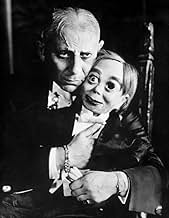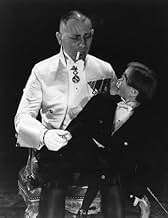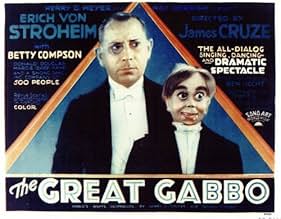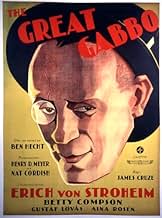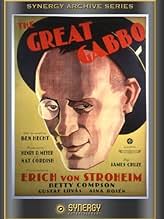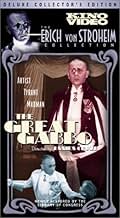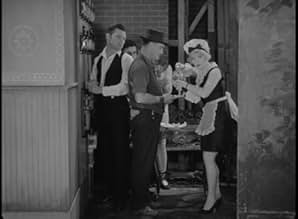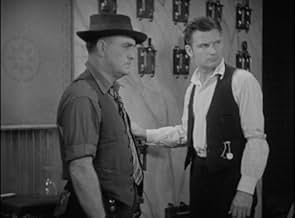VALUTAZIONE IMDb
6,0/10
1080
LA TUA VALUTAZIONE
Aggiungi una trama nella tua linguaAn insanely, egocentric ventriloquist, even though he is possessed by his wooden dummy, is in love with a dancer who is in love with another. The dummy gives advice to the ventriloquist.An insanely, egocentric ventriloquist, even though he is possessed by his wooden dummy, is in love with a dancer who is in love with another. The dummy gives advice to the ventriloquist.An insanely, egocentric ventriloquist, even though he is possessed by his wooden dummy, is in love with a dancer who is in love with another. The dummy gives advice to the ventriloquist.
Erich von Stroheim
- The Great Gabbo
- (as Eric Von Stroheim)
Marjorie Kane
- Babe
- (as Margie 'Babe' Kane)
George Grandee
- Otto
- (voce)
- (non citato nei titoli originali)
Bo Peep Karlin
- Dancer
- (non citato nei titoli originali)
Rosina Lawrence
- Dancer
- (non citato nei titoli originali)
Harry Ross
- Performer
- (non citato nei titoli originali)
Eddy Waller
- Vaudevillian
- (non citato nei titoli originali)
Marbeth Wright
- Dancer
- (non citato nei titoli originali)
Recensioni in evidenza
As director and actor Erich Von Stroheim did some very weird films and The Great Gabbo is certainly one of them. In this Von Stroheim is a star attraction in a Ziegfeld Follies type stage review and he is fixated on Betty Compson who used to be his assistant in his act, but walked out on him because he treated her shabbily.
Now she is keeping company with Donald Douglas a young hoofer in the show. He's actually upset as well with her interest in Von Stroheim.
In a way it's hard to review this because just the name of Erich Von Stroheim brings up images of barbaric cruelty show on the screen. The name alone is sufficient to conjure up horrible images.
So Von Stroheim wants to set up house with her and his dummy Otto. As in most ventriloquist stories the dummy functions as an alter ego.
All this with the backdrop of a Ziegfeld type show. That was interesting and like Glorifying The American Girl, The Great Gabbo is a nice filmed record of what these shows were like on stage.
Although Von Stroheim is always interesting, The Great Gabbo's best value is as a record of the type musical revue so popular back then.
Now she is keeping company with Donald Douglas a young hoofer in the show. He's actually upset as well with her interest in Von Stroheim.
In a way it's hard to review this because just the name of Erich Von Stroheim brings up images of barbaric cruelty show on the screen. The name alone is sufficient to conjure up horrible images.
So Von Stroheim wants to set up house with her and his dummy Otto. As in most ventriloquist stories the dummy functions as an alter ego.
All this with the backdrop of a Ziegfeld type show. That was interesting and like Glorifying The American Girl, The Great Gabbo is a nice filmed record of what these shows were like on stage.
Although Von Stroheim is always interesting, The Great Gabbo's best value is as a record of the type musical revue so popular back then.
Bizarre in the extreme but a highly entertaining film about a mad ventriloquist and the woman who loves him.
Erich von Stroheim makes his talkie debut as the spooky/mad ventriloquist who often speaks through his dummy (Otto) and eventually goes totally mad. Betty Compson plays his harried assistant who is finally driven away through his cruelty and madness. But they meet up again 2 years later when von Stroheim has become a star.
We get several scenes about the masochistic relationship between the stars played out against the background of a big New York revue. There are several terrific 20s songs in this film and one unforgettable production number with Compson and Donald Douglas as a fly and spider perched on a giant web.
The film also boasts the zippy Marjorie Kane who intros "That New Step." Von Stroheim is good and has a surprisingly light accent, but Compson steals the show as the pathetic assistant who can't understand him. She also gets to sing "I'm in Love with You" and adds one more talent to her resume of skills. Compson was also a concert violinist (see INSIDE THE LINES).
Compson and von Stroheim are excellent and the whole production becomes more and more surreal as it goes on. Certainly worth a look even if one number is missing (the "Ga Ga Bird") as are the Technicolor sequences. The whole film is black and white. The number "Every Now and Then" is tops.
Compson was one of the busiest actresses in Hollyword during the late 20s and early 30s.... she's a gem.
Erich von Stroheim makes his talkie debut as the spooky/mad ventriloquist who often speaks through his dummy (Otto) and eventually goes totally mad. Betty Compson plays his harried assistant who is finally driven away through his cruelty and madness. But they meet up again 2 years later when von Stroheim has become a star.
We get several scenes about the masochistic relationship between the stars played out against the background of a big New York revue. There are several terrific 20s songs in this film and one unforgettable production number with Compson and Donald Douglas as a fly and spider perched on a giant web.
The film also boasts the zippy Marjorie Kane who intros "That New Step." Von Stroheim is good and has a surprisingly light accent, but Compson steals the show as the pathetic assistant who can't understand him. She also gets to sing "I'm in Love with You" and adds one more talent to her resume of skills. Compson was also a concert violinist (see INSIDE THE LINES).
Compson and von Stroheim are excellent and the whole production becomes more and more surreal as it goes on. Certainly worth a look even if one number is missing (the "Ga Ga Bird") as are the Technicolor sequences. The whole film is black and white. The number "Every Now and Then" is tops.
Compson was one of the busiest actresses in Hollyword during the late 20s and early 30s.... she's a gem.
If there ever was any schizophrenic example of musicals then that would be 'The Great Gabbo'. This is disturbing psychological drama interrupted by lavish and wonderful dance and music numbers. James Cruze is credited as a director but to be honest most of the non-musical scenes have von Stroheim all written over them. And not only because von Stroheim played in them but there is some sort of very specific psychologically tense atmosphere in them. It is unknown to me how much control von Stroheim had over the production but it is clear (to everyone familiar with von Stroheim's work) that he at least gave some instructions.
The film is much more than just a curiosity - two seemingly different movies, a psychological drama, and a musical tied together. Erich von Stroheim brilliantly plays brilliant ventriloquist Gabbo who is mad or driven mad by his art. When we first meet Gabbo on the screen, we see an unpleasant cruel man who in his egocentrism and perfectionism blames everyone else for his failures. After his lover and partner Mary (Betty Compson) drops the tray in the middle of the performance, he accuses her again. She leaves her but not with a light heart. Pass the two years and they both have worked their way up into Broadway. They meet again when they both appear in the same review show.
The dramatic parts concentrating on Gabbo and his relationships with other people are good but quite poorly developed. Probably because of the forceful inclusion of the musical numbers that do nothing to forward the story or even add anything to it. And this is crystal clear while watching the movie. These would have worked in a lesser amount as just a backdrop for the story. Although, I have to say the musical numbers were interesting to watch but that was the wrong movie for them. The dramatic parts are heavy and the sudden transition into the musical numbers puts the viewer off. Although the musical numbers separately are interesting I found them distracting and thus it made it difficult to follow the story.
Although the movie is inconsistent and didn't quite work, it is still worth watching especially for its uniqueness in the musical category.
The film is much more than just a curiosity - two seemingly different movies, a psychological drama, and a musical tied together. Erich von Stroheim brilliantly plays brilliant ventriloquist Gabbo who is mad or driven mad by his art. When we first meet Gabbo on the screen, we see an unpleasant cruel man who in his egocentrism and perfectionism blames everyone else for his failures. After his lover and partner Mary (Betty Compson) drops the tray in the middle of the performance, he accuses her again. She leaves her but not with a light heart. Pass the two years and they both have worked their way up into Broadway. They meet again when they both appear in the same review show.
The dramatic parts concentrating on Gabbo and his relationships with other people are good but quite poorly developed. Probably because of the forceful inclusion of the musical numbers that do nothing to forward the story or even add anything to it. And this is crystal clear while watching the movie. These would have worked in a lesser amount as just a backdrop for the story. Although, I have to say the musical numbers were interesting to watch but that was the wrong movie for them. The dramatic parts are heavy and the sudden transition into the musical numbers puts the viewer off. Although the musical numbers separately are interesting I found them distracting and thus it made it difficult to follow the story.
Although the movie is inconsistent and didn't quite work, it is still worth watching especially for its uniqueness in the musical category.
This film about a ventriloquist who lives a self-imposed life of lonliness because of his personality is absorbing, different, and dated. Shortly produced after The Jazz Singer(1927), the film is an early talkie with all the characteristics of an early talkie. It has somewhat stilted stages, little camera movement, and most annoying, a bunch of Busby Berkley type musical numbers that have little to do with the plot. All that notwithstanding, the lead role of Gabbo, a man who lives to be successful no matter what it takes, who is willing to forsake personal happiness to achieve, who runs the scope of emotions in minutes, is played with gusto by that wonderful actor(and even greater director) Erich Von Stroheim. Von Stroheim uses all his European charm(and decadence) as the man who shares life and lives with and through his dummy Otto. There are no supernatural aspects about the relationship with Gabbo and Otto. The movie is in no way a horror picture(although very often advertised as such). It really is a story of the problems a man has exhibiting his emotions, living with others, and living with himself. Some of the scenes are very well-done, including the last shot as we see Gabbo avoid a ladder. The rest of the cast is effective with Betty Compson as a love interest doing a fine job, and Donald Douglas as a lead singer/romantic figure being absolutely absurd. If for no other reason, see the film to see Von Stroheim in action. There was no one like him.
Though I agree with previous reviewers' comments about the good performances turned in by Erich Von Stroheim and Betty Compson, I thought the movie was disappointing overall. There isn't really much of a story, the dramatic scenes are often slow, and the rather bizarre musical numbers are poorly integrated into the plot. I'm not sure why this movie isn't classified as a musical, though; it has as many numbers as "42nd Street" and other similar titles from about the same period. Unfortunately, as a previous reviewer said, these scenes are not as creatively done as those by Busby Berkeley; the choreography is often unappealing, and the dancers don't look very well-rehearsed, though there are some bright spots.
Interestingly, the contemporary "Variety" review mentioned a color sequence in the film, which was not present on the Video Yesteryear VHS copy I watched. I wonder if this piece is lost, or available on other editions?
Interestingly, the contemporary "Variety" review mentioned a color sequence in the film, which was not present on the Video Yesteryear VHS copy I watched. I wonder if this piece is lost, or available on other editions?
Lo sapevi?
- QuizThe dummy Otto was a hand carved basswood Frank Marshall figure. The same man who designed Edgar Bergen's famous characters Charlie McCarthy and Mortimer Snerd.
- BlooperOverlooking the seeming impossibility of Gabbo having Otto the Dummy speak while Gabbo is eating, smoking, and drinking, Otto's head and mouth move with the words and music when Gabbo is at least six feet away.
- Versioni alternativeIl gran Gabbo (1929) was originally released by Sono Art-World Wide Pictures, with certain sequences were presented in Multicolor. However, current prints, restored by the Library of Congress and released by Kino International on DVD, exist only in black-and-white. Most, perhaps all, VHS and DVD releases of the film have the color sequences in black and white.
- ConnessioniEdited into The Girl from Calgary (1932)
- Colonne sonoreEvery Now and Then
(uncredited)
Written by King Zany and Donald McNamee
Performed by Marjorie Kane and Donald Douglas
I più visti
Accedi per valutare e creare un elenco di titoli salvati per ottenere consigli personalizzati
Dettagli
- Data di uscita
- Paese di origine
- Lingue
- Celebre anche come
- The Great Gabbo
- Luoghi delle riprese
- Azienda produttrice
- Vedi altri crediti dell’azienda su IMDbPro
- Tempo di esecuzione
- 1h 32min(92 min)
- Colore
Contribuisci a questa pagina
Suggerisci una modifica o aggiungi i contenuti mancanti

